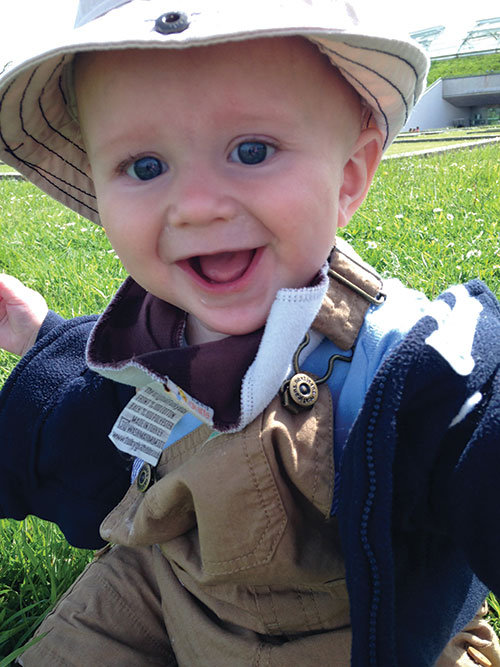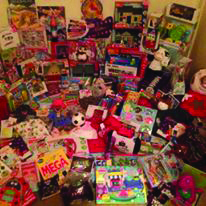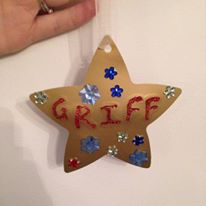When the worst happens
My training had been pretty unremarkable until that point. Sitting in a ‘return to
work’ meeting with one of the senior members of the School of Anaesthesia, she
remarked at how strange it was that we had never had reason to meet before.
I had been on maternity leave following the birth of my second child, Griff. Sitting
on the beach on 21 June 2014, I remember looking out to sea and thinking how
content I was. My 4-year old daughter splashed about paddling, and Griff sat
running his toes through the sand.
A week later, I left him for the first time overnight and went
to visit a friend. I kissed both little ones goodbye at the train
station, and headed off for the first couple of drinks out I’d had
in months.
I woke up surprisingly early the following morning and looked
at my phone. I had scores of missed calls. When I finally got
through to someone it was my Mum. It was her birthday: “Griff
is in hospital”. My first thought was not to panic; he had been
completely fine the night before. It quickly dawned on me that if
he was well 10 hours previously, this was serious.
I spoke to his PICU consultant and I was calm. It’s amazing what
being an anaesthetist does for you when you need to keep a
cool head. Griff had been found between the bars of the bed
and the mattress. He had been resuscitated by a team which
included my friends. She told me what I already knew “I think he
is going to die”.
The next few hours are a bit of a blur. I know I was wearing a
duck shower cap when the police arrived. I know I went from
police van, to car, to car in order to blue light me back to Wales.
I remember the comforting familiar accent of the officer from
South Wales Police.
We withdrew organ support the following morning and Griff
died a few minutes later. He was eight months old.
The journey from that day to this has been, well, an interesting
one. You may be surprised to hear that it hasn’t been all sad. I
mean, some of it has been dreadful. However, the experience
I have had ‘on the other side’ has in many ways enriched my
appreciation of life, love and my role as a medic.
So why write this article? It certainly isn’t to make you feel low, or
because I want you to feel sorry for me. Everyone’s experience of loss is very different. I can only speak for myself, but I hope
that by sharing a few things I have learned it might be helpful for
someone struggling, whatever the reason.

I’ve learned that the reactions I have encountered are not borne
of malice, but because people don’t know what on earth to say.
Some have ignored me completely. Some have burst into tears.
Some have said things like "Well, you can’t take your eyes off
kids". But none of those people meant to hurt me. It’s just really
bloody awkward for them.
- The hardest things may be unexpected
Of course I was going to struggle with paediatric resus –
who doesn’t? - but obstetrics would be fine, right? Stepping
into the labour ward for the first time was suffocating and it
completely blindsided me. The joy, expectation and heartbreak
all wrapped up in those four walls. At times the hurdle seemed
insurmountable, but the rawness eased and I’m back to disliking
obstetrics for the same reasons as anyone else!
- Anticipation is often worse than reality
I was terrified about my first paediatric arrest call. When it came,
I wanted to do my best for that family, and I did. That’s not to
say that if I hadn’t coped I would have somehow failed, but
sometimes we surprise ourselves with what we can do.
- Progress is not a straight trajectory
It is comforting for observers to see you gaining confidence day
by day. The truth is some days one will be flying, and the next
swimming uphill in a river of custard again. Accepting the ups
and downs has helped.
- It’s a marathon, not a sprint
A life event that shakes you to your very core is going to
affect you for a long time. I naively thought that I could
go straight into ‘work mode’ and be fine. My Trainee
Programme Director suggested that a gentler return
would be a good idea - she was right. I’m still working
on myself every day, and I can’t see that process ending
any time soon. Don’t push yourself too hard too fast.
- Personal experience can make us better doctors
Being ‘on the other side’ has given me an appreciation
that no course or tutorial could teach. I have tried to
use my experience to be a better communicator, and to
really listen to patients and relatives. And offer them a
cup of tea.
- Don’t sweat the small stuff
These days I couldn’t give a monkey’s about the little
things that used to grind my gears. It’s actually quite
liberating. It’s not that those things aren’t important
anymore, but in the grand scheme of things is there any
point being stressed about them?
My anxiety has a propensity to run wild if I don’t look
after my mental health. I’ve not suddenly started going
on yoga retreats – if that’s for you that’s brilliant, but it
isn’t for me. But I have started taking an occasional day
off to go shopping. Self care can be difficult. It’s easy to
feel I don’t deserve it, as my son doesn’t get to enjoy
life. But looking after myself isn’t disrespecting him, it’s
keeping me afloat.
- There are wonderful people in the world
The kindness of others never ceases to amaze me. To
anyone who dropped off a hot meal, ran with me for
charity or posted me a gin and tonic in a can (!), thank
you. Accepting help can be really hard, but it can pull
you through the darkest days.
- There can be positives even in the worst of times
Griff’s death changed my whole world. But his life
brought so many things that I am grateful for. He taught
me how to appreciate what I have, and to not take
tomorrow for granted. I’m so proud of all he achieved
in his short life. He brought us so many smiles, and even
after his death he has been an inspiration: we donated
his heart valves; money was raised for PICU in his name;
and for three Christmases we collected ‘Griff’s Gifts’ for
charity. His sisters know what an amazing little man he
was, as they are amazing little women. We go forward as
a family of five, it just that you can only see four of us.


Natalie Mincher
Locum Consultant Anaesthetist
Royal Gwent Hospital, Newport